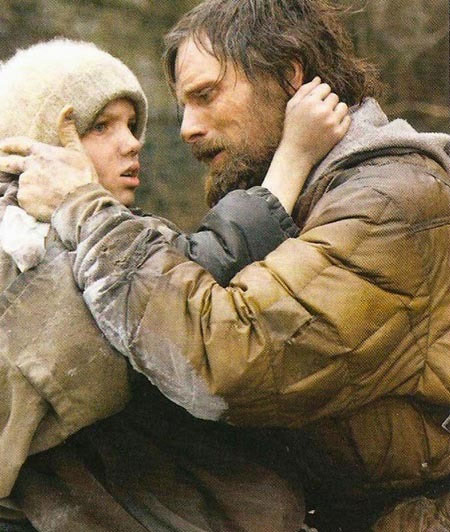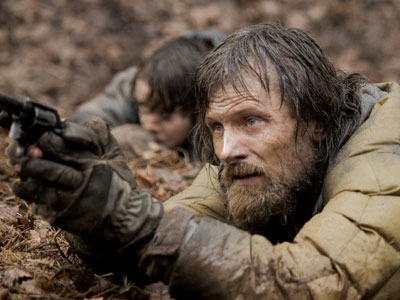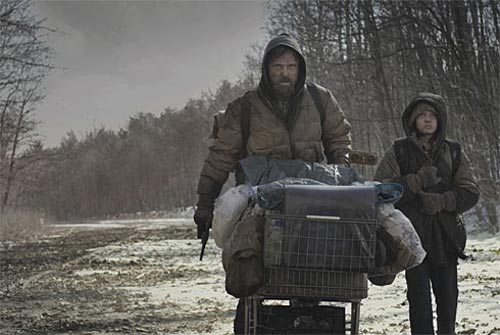 Viggo Mortensen is just as introspective as you’d expect him to be – especially when he’s talking about his latest film, The Road, an adaptation of Cormac McCarthy’s post-apocalyptic novel. Mortensen and his young co-star Kodi Smit-McPhee play a father and son who are left to live in a world gone ka-blooey, fighting for their lives against insurmountable odds, such as the cold, harsh elements, starvation, cannibalistic survivors. Yeah, not the most happy of topics to discuss with the man who used to be Aragon, but the soft-spoken actor tells us in great detail the emotional journey he and Smit-McPhee went on making this film, experiences that were daunting, exhaustive – and almost poetic.
Viggo Mortensen is just as introspective as you’d expect him to be – especially when he’s talking about his latest film, The Road, an adaptation of Cormac McCarthy’s post-apocalyptic novel. Mortensen and his young co-star Kodi Smit-McPhee play a father and son who are left to live in a world gone ka-blooey, fighting for their lives against insurmountable odds, such as the cold, harsh elements, starvation, cannibalistic survivors. Yeah, not the most happy of topics to discuss with the man who used to be Aragon, but the soft-spoken actor tells us in great detail the emotional journey he and Smit-McPhee went on making this film, experiences that were daunting, exhaustive – and almost poetic.
Step 1: Read Cormac McCarthy’s book to stay inspired
Viggo Mortensen: “The moment I read [the script], I went out and got the book. I hadn’t read it yet, even though I had read all of Cormac McCarthy’s books, and it was some book. And the script was a very faithful adaptation. But I was reluctant [to do the movie]. I had initially said I don’t think so. I told my agent I was really worn out, I won’t be focused. And then I looked at the story and thought, ‘Well, you know, being worn out might work.’ There were times when it was just bubbling under the surface, being too tired, annoyed, kinda depressed. Sometimes it did help. But then – you can’t put something in there that isn’t in the story just to distract people. You can but then it’s not done the right way. But how do you keep it from being flat? OK, enough with the suffering already, yet you trust the story, and there are so many things learned along the way, and the interactions with people and the environment and from each other, not always agreeing, you just have to trust what Cormac McCarthy wrote. And because the script was a very faithful adaptation, you just have to trust that book, that there are inherently dramatic situations and moments, the overall predicament, stripped away, what do you do? How do you behave? How do you treat others? Do you even care anymore about being alive? Do you know why you want to stay alive? Do you find out a reason to stay alive by the end? I think, yes you do and THAT is interesting.”
Step 2: Then talk to Cormac McCarthy
Mortensen: “I talked to him one time before shooting, a relatively long conversation. We just talked about my kid, his kid, being dads. And at the end of the conversation, he asked me if I had any questions. He hadn’t read the script and he didn’t want to read the script, which is unusual for a writer. He says ‘It’s a different medium, you guys just do your thing, but do you have any questions about the book?’ I mean, I had a pad, 50 post-it notes in the book, not one but TWO pens in case one ran out of ink, I was ready to pick his brains. But when he asked, I said, ‘Nah, I don’t really’ because [what we talked about] was all I needed to get going. That there is something universal about this adult and this child. I think that’s why this book has had such a reach, more so than any other [Cormac McCarthy] book, even though with No Country for Old Men‘s Oscar success. It’s so heartfelt and so free of gimmickry, this story. It transcends cultures and languages, which makes it a very successful book. And a lot of people are looking forward to seeing the movie, which makes me hopeful because it’s a daunting kind of movie.”
 Step 3: Prepare to strip your soul bare
Step 3: Prepare to strip your soul bare
Mortensen: “Very different from any other role I’ve done, just how much I had to throw away. Because really it’s about being naked emotionally and just be honest about it. In subtle ways and in ways that are more obvious. But it had to be real, very organic, which was the most daunting thing. Not so much the physical journey we would make if this was going to be done properly, but what I would have to expose, from here [he points to his heart]. I thought I might need some help, especially from the boy. I hoped they’d find a great boy. I read with the last four, and Kodi was the very last one. There was just something about him, he at least understood the story in a way that maybe the other kids didn’t. I mean, he’s a joyful, well-adjusted kid, but there’s something in his eyes when he was playing those scenes, even in those auditions, that was sad, knowing. I thought, ‘Wow, this could work’ cause I was really worried if we didn’t have a great kid, it wouldn’t matter what I did.”
Step 4: Protect the kid because, man, he goes through some rough stuff
Mortensen: “It was hard emotionally, but what helped us and what he didn’t like, was the fact we were so cold and wet all the time, tired. Particularly cold for Kodi because he is from Southern Australia, although you couldn’t tell from listening to him in the movie. He’d never seen snow, and the first day it was snowing and very cold. He couldn’t believe how cold it was, and it wore him out pretty quickly, which pushed his emotions to the surface – and mine. It made me more protective of him in that way. Just trying to get him through the day, and the next day. It’s kind of like the story, in a way. Had it been shot with green screen, it wouldn’t have been the same. Yes, he’s a good little actor, and together, we would have made it seem like we were cold, but it wouldn’t have worked the same. Because it was so difficult in a way, for both [me and Kodi], we both grew to be very close friends and found a sense of satisfaction for having gone through it. ”
Step 5: Remember what it was like to be a kid, realizing your parents weren’t gods
Mortensen: “When I started doing the movie, I thought about my own son quite a bit. And that transition that he also made in his pre-adolescence. Kodi reminded me of my son a lot, the character in the movie, kind of wise beyond his years. And that transition you see in the story, when the kid is calling his dad out on his straying from path that he had been teaching his son. I remember that phase [when his son did the same thing] and how I didn’t much like it but learned to accept it when he was right. That’s universal. Any parent who has a relatively consistent relationship with their kids, no matter how good or bad it is, there comes a point in adolescence when they look at their dad or their mom or both of them and realize that they are not gods. And then they rip them. Because it’s such a shock, you want your dad to be that and then they’re not; it’s massively disappointing. You know what I mean? But it’s natural that it happens and sometimes, even really good kids, can be brutal by tearing that adult off the pedestal that they thought they were on. And it can be hard to take as an adult, but you have to find a way to take it eventually. Then, what’s interesting in life, is as you get older – I remember being that way towards my dad, and when I got into my late 20s, early 30s, I realized I wasn’t a god either. It takes awhile, because if you are tearing something down off the pedestal, it means you are putting yourself above it in some way. And you don’t realize it in some way, it’s instinctive.”
Step 6: Research by talking to homeless people
Mortensen: “I did speak to them just to ask them how they got this way and how they felt about it. Not all of them would want to talk, which was fine, like anybody in life. Very rarely, but some were living that way by choice. Some lost their job, some it was drugs. Mostly it was just financial hardship, there was no other thing they could do. And how they felt about it, how they kept alive, and what things they worried about. Have to figure out where they were going to sleep so no one could do them harm or steal their stuff.”
 Step 7: Worried that the world may end as we know it
Step 7: Worried that the world may end as we know it
Mortensen: “Of course, sure I do. Even though it’s not explained [in The Road], you believe the emotional journey, believe the visual, the landscape, it’s real. We shot in real places that had been devastated by nature AND by man. This made me think more about my son, my family and just about how life is, that it is worth making that effort to see more, learn more. To appreciate it. It’s a very simple idea in a way. No matter what the excuse not to be kind, it’s always better to be kind. Simple. But if you make this journey honestly as a spectator or as us filmmakers, you earn the right to come to that simple conclusion and you understand in a profound way. In a lot of the Q&A screenings, I noticed in the first few rows that they were crying or had been crying, obviously moved, but they have a hint of a smile at the same time. So somehow the ending is strangely uplifting. And I see reflected in their faces exactly how I felt telling the story. Even though I know this film backwards and forwards, the first time I saw it still affected me so viscerally.”
Step 8: Could you survive in this scenario?
Mortensen: “I don’t know. I don’t know if I’d have the courage to keep going if it looked impossible. I’d like to think I would. I’m actually better with a gun than he is, more comfortable. He’s learned to be, but needed to make it seem that way. Not like an action guy. And he is constantly reminding himself and the kid of what to do.”
Step 9: Realize an Oscar nomination can help spread the word
Mortensen: “If you see it, you are there but describing it, you’d think, ‘I don’t want to see that!’ Which is why a lot of people said it couldn’t be done. You can’t make an engaging, entertaining, beautiful, poetic story movie from this book. It can’t be done. They were wrong. And if you see it, I find people will tell others they should see it. It’s a very word-of-mouth movie – and there’s no better word-of-mouth than reading in a newspaper, ‘Oh, nominated for Best Picture, Best Actor, Best Supporting Actor.’ It would help this movie get seen, I know that. It would help any movie, but especially a movie like this. As far as the likelihood of that happening? I don’t know. I was sure with A History of Violence that David Cronenberg would be nominated for Best Director and it would get a Best Picture nomination, but it didn’t get that. Then for Eastern Promises, I ended up getting nominated for every ceremony. It was like ‘Wow, how did that happen?’ So you just never know. But I know with a movie like this, it would be really helpful.


One thought on “How to Interview: Viggo Mortensen”
Comments are closed.